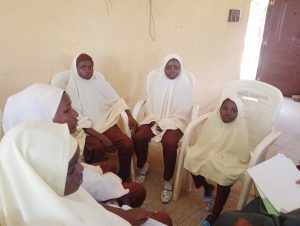No fewer than 1,620 girls participated in Safe Space activities supported by the UN Population Fund (UNFPA Nigeria) in Sokoto State.
Mrs Ubaida Abdulnasir, the state’s Team Lead at the Centre for Girls Education (CGE), the implementing Non-Government Organisation, told the News Agency of Nigeria (NAN) in an exclusive interview in Sokoto on Sunday that 81 mentors in Sokoto North and Binji local government areas were also equipped with knowledge on life skills, jolly phonics and Gender-Based Violence (GBV).
Abdulnasir said that under the intervention, CGE provided the girls with knowledge on jolly phonics, life skills, and issues on GBV.
According to her, issues discussed at the Safe Space focus on rudiments of mentoring, mentors standard practices, practical sessions, and others.
The team lead said “there is an obvious increase in the number of girls’ school retention following mentoring at the safe space.

“The girls also teach other members of their families about what they learnt in the safe space. The academic performance of some of the girls attending safe space has also improved.’’
Abdulnasir added that another project was also introduced with support of UNFPA and other donors, where 40 peer educators were equipped with knowledge and skills to promote optimal health and development of adolescents and young people.
She said “in the implementation of the Ripple Project, 3,038 peer educators acquired knowledge and gained information on Sexual Reproductive Health and Rights (SRHR).
“Other topics were Sexual and Gender Based Violence/Violence Against Women and Girls (SGBV/VAWG), Family Planning (PF) and Harmful Practices (HP), Female Genital Mutilation (FGM) and Early Child Marriage in various communities of Sokoto State.’’
A Junior Secondary School (JSS 3) 3 Safe Space student, Ruqayya Ahmad Khalid, said she learnt a lot on moral training, body hygiene “and how to prevent ourselves from sexual harassment and other forms of abuse.
“We also learnt how to prevent ourselves from contracting diseases, menstrual hygiene and how to advance our studies to acualise our future dreams.’’
Another Safe Space student, Balkisu Sani from Yahaya Abdulkarim Secondary School, Sokoto, said the safe space allowed her and her peers to discuss silent and personal issues affecting their lives.
Sani said “at the safe space, we talk about issues that we don’t even discuss with our parents.
“The safe space allowed us to jointly discuss many issues that we think are secret to us with the facilitators and they provide solutions to our problems.’’
According to her, participants also acquire business skills at the safe space as the facilitators encourage them to embark on businesses that will augument their family income.